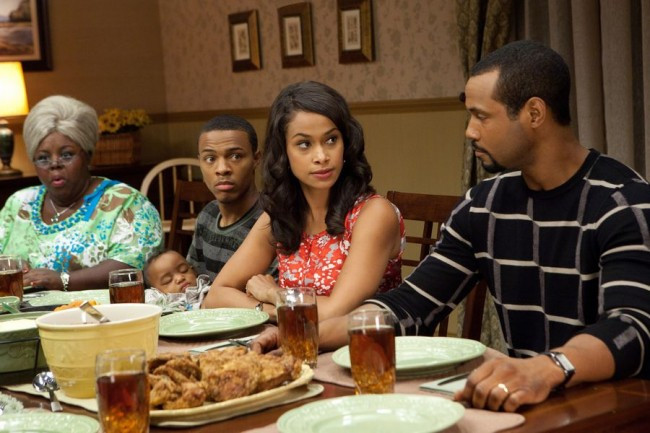Tyler Perry. The name itself has become a brand, synonymous with a certain type of filmmaking that resonates deeply with a dedicated audience. Before his movies graced the silver screen, Perry built his empire from the ground up, starting with theater productions like Diary of a Mad Black Woman. His most iconic creation, Madea, emerged from these early works, captivating audiences and propelling Perry to Hollywood success, all while maintaining ownership of his Atlanta-based production company. This independent spirit is crucial to understanding both Perry’s triumphs and, arguably, his missteps, especially when considering films like Madea’s Big Happy Family.
One might argue that the absence of studio oversight allows Perry’s unique vision to flourish. However, it also raises questions about quality control and broader audience appeal. As a critic approaching this film, it’s important to acknowledge any personal biases. While some might debate the necessity of “qualification” to review a film, it’s fair to say that Madea’s Big Happy Family is tailored to specific demographics, and understanding this is key to analyzing its effectiveness.
The central figure, Madea, is a complex character. Marketed as a peacemaker, she often resorts to outlandish and even aggressive behavior. Her introductory scene in this film involves an altercation with a fast-food worker, showcasing her volatile nature. Madea is portrayed as bipolar, admits to past incarcerations (as explored in the arguably superior Madea Goes to Jail), yet is still presented as a lovable matriarch. This contradiction forms the core of her appeal for many, but also the source of criticism for others.
The “Madea Universe” operates with a loose continuity across films. Similar to The Muppets, each movie assembles a new ensemble cast facing relatable problems, with Madea acting as a chaotic catalyst. Perry consistently tackles weighty issues – drug abuse, domestic violence, sexual assault, and financial struggles – within a comedic framework. While his directorial skills have shown growth, particularly in the underrated Daddy’s Little Girls and his ambitious, though flawed, adaptation of For Colored Girls, Madea’s Big Happy Family feels like a significant regression. It’s as if Perry has revisited an older, less refined script, recycling familiar themes. The motivation seems clear: to sell tickets to his devoted fanbase.
 Tyler Perry as Madea in Madea's Big Happy Family movie
Tyler Perry as Madea in Madea's Big Happy Family movie
To appreciate Perry’s potential, consider the ending of Why Did I Get Married Too?. In a masterful five-minute sequence, he evokes a rollercoaster of emotions – laughter, shock, tears, and then comedic relief with a perfectly timed Dwayne “The Rock” Johnson cameo. This scene exemplifies Perry’s capacity to connect with an audience on a deeply emotional level. Experiencing it with a crowd amplifies its impact.
Unfortunately, Madea’s Big Happy Family fails to capture this magic. The title itself is misleading; happiness is scarce within this dysfunctional family. The story revolves around Shirley (Loretta Devine), a woman of faith facing a cancer relapse. She is supported by Aunt Bam (Cassi Davis), whose marijuana use provides cheap laughs, bordering on irresponsible humor considering the film’s target audience.
Shirley’s family is a collection of unresolved conflicts. Her three “children” (a plot twist later reveals the complicated truth) are Tammy (Shannon Kane), an aggressive real estate agent; Sabrina (Natalie Desselle-Reid), seemingly more stable but still troubled; and Byron (Shad “Bow Wow” Moss), an 18-year-old juggling an infant son, a demanding girlfriend, and a confrontational baby mama who airs their drama on a Maury Povich-style television show.
While cinema has explored the lives of unhappy, realistic characters with great success – Mike Leigh’s Another Year being a prime example – Madea’s brand of humor and melodrama falls short in comparison. Madea is no Jim Broadbent in terms of nuanced character portrayal. Perry’s formula, particularly when adapting his stage plays, feels increasingly lazy here. The performances often carry a theatricality that feels out of place on film, echoing the weaknesses of the poorly received Diary of a Mad Black Woman. Madea’s over-the-top antics, while possibly entertaining on stage, become jarring in a film that awkwardly shifts between tones. It lacks the subtlety and effortless control of filmmakers like Leigh, whose slower, more deliberate approach yields masterful results.
Since 2006, Perry has maintained a prolific output, writing and directing ten films, five of which feature Madea. Madea Goes to Jail stands out as one of the stronger entries in the Madea cinematic universe. Perry has demonstrated a talent for melodrama in films like The Family that Preys, which tackles class issues, and the charming Daddy’s Little Girls, arguably his best work to date. There was a sense that Perry was on the cusp of a significant breakthrough, a potential that still lingers. Madea remains a beloved character for a reason, yet that affection is barely discernible until the very final moments of this otherwise disjointed, unfunny, and ultimately weak film.
